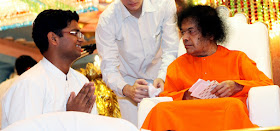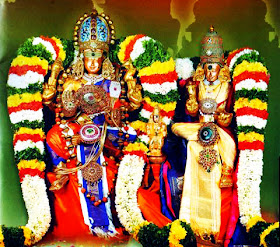In a village, if anyone helps us, when they talk to us and enquire about our well-being, we reply saying ‘thanks’. When you drop your kerchief and it is returned back, you express your gratitude by saying ‘thanks’. You pay tax for using water and electricity. You construct a house on the site that belongs to you, and yet you pay the house tax. If you want to have a fan then you have to pay the electricity bill. If you make use of water from the tap then you pay the water tax. But what tax do you pay for the wonderful breeze given by God? What kind of tax do we pay for the sun which gives light to the entire universe? What tax do we pay for the downpour of rain which gives us the perennial source of water such as the rivers, which are incomparable to the municipal water tanks? When you have a certain boundary limit of 40 by 30, then you pay the land tax. Who gave you that land? God has given it. All the five elements are Divine.
What are God’s gifts? Light, water, air, wind and sound are God’s gifts. These are all given free to humanity by God. This earth is also a gift of God. All of God’s gifts are offered free. We enjoy being the beneficiaries. But do we pay tax to God? Is this enquired by man or any educated person? God has given us these eternal and essential things but what kind of tax do you pay for using them? Yet we blame God for not giving us this and that.
Instead of helping, we are harming. You don’t pay tax or express gratitude for all the things that you have received, and yet you want more. Because of excessive desires, you have bad habits too. Because of these bad qualities you are egoistic. Excessive desires, bad habits and egoism are not human qualities. Human qualities are peace, forbearance and sympathy. You should lead a life of satisfaction. Today mankind has no satisfaction whatsoever. This beautiful world was made much more beautiful by God. Look at the shining moon. Where is the moon? God has kept the moon on His head (referring to Lord Shiva often referred to as Chandra Shekhar or Shashank Shekhar, meaning – the One who is adorned with the moon on His head). The coolness of the moon is passed on to everyone. When the world is shining beautifully under the glow of the moon you are carried away by worldly peace and joy. Such a heart is gifted to mankind by God. What sort of a heart is it? It is a very cool heart. It is a heart of love, a heart full of sympathy for everybody in distress. Though God has given us such a noble heart we are spoiling it. We pollute it. We make it unholy.
The Tax of Gratitude
What are God’s gifts? Light, water, air, wind and sound are God’s gifts. These are all given free to humanity by God. This earth is also a gift of God. All of God’s gifts are offered free. We enjoy being the beneficiaries. But do we pay tax to God? Is this enquired by man or any educated person? God has given us these eternal and essential things but what kind of tax do you pay for using them? Yet we blame God for not giving us this and that.
Instead of helping, we are harming. You don’t pay tax or express gratitude for all the things that you have received, and yet you want more. Because of excessive desires, you have bad habits too. Because of these bad qualities you are egoistic. Excessive desires, bad habits and egoism are not human qualities. Human qualities are peace, forbearance and sympathy. You should lead a life of satisfaction. Today mankind has no satisfaction whatsoever. This beautiful world was made much more beautiful by God. Look at the shining moon. Where is the moon? God has kept the moon on His head (referring to Lord Shiva often referred to as Chandra Shekhar or Shashank Shekhar, meaning – the One who is adorned with the moon on His head). The coolness of the moon is passed on to everyone. When the world is shining beautifully under the glow of the moon you are carried away by worldly peace and joy. Such a heart is gifted to mankind by God. What sort of a heart is it? It is a very cool heart. It is a heart of love, a heart full of sympathy for everybody in distress. Though God has given us such a noble heart we are spoiling it. We pollute it. We make it unholy.
The Tax of Gratitude
Having been the recipients of God’s mercy, we must pay Him some tax. Sages and the Rishis of olden days called it Bali or sacrifice. Sacrifice was considered as tax to God. But people misunderstood the meaning of sacrifice and started sacrificing animals as tax to God. Sacrifice is not harming any animal. We have to pay tax to God. What is this tax? Expression of one’s own gratitude is tax payment. How do you express it? You express it by praying. All the bliss that you enjoyed in the heart should be conveyed by words in your prayer. You should utter true words and pay the tax. Truth is the real jewel given to man and charity is the precious ornament given to man’s hand. With these hands we should pray to God. That is what Potana said, “Oh Rama! We don’t pray to God with full devotion from this heart and don’t sing his glory full throated. What then is the use of the heart and the throat?”
Why is this tongue given to you? Is it only to eat? Though men have tongue they don’t sing the glory of God. It is their fate. It is like the tongue of a frog. Why is the tongue given to you? The tongue is given only to chant the name of God. What is the use of these hands if you don’t sing Bhajans and don’t clap your hands? Join both the hands, indicating the unification of the ten senses. Sing the glory of God and pay the tax. Otherwise you will be indebted.
Source: “Pay The Tax of Gratitude”, Discourse 3, My Dear Students Volume 4






















